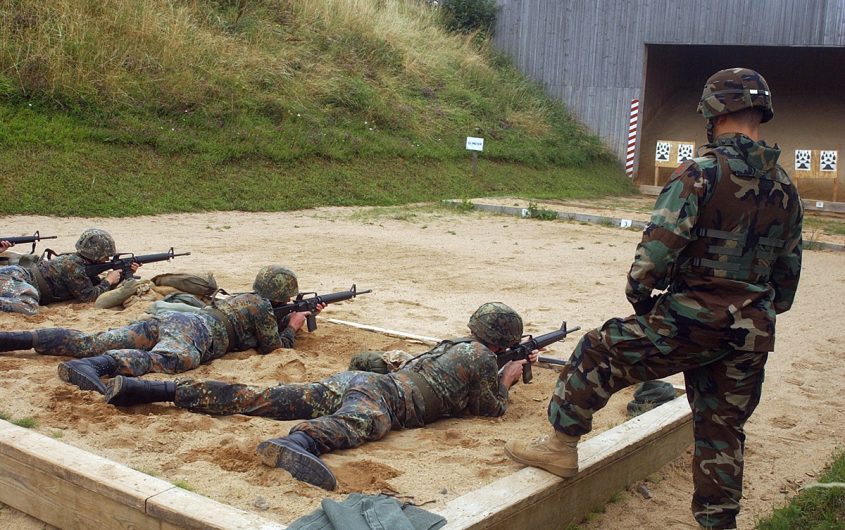
Reinstating Conscription: Wrong Issue, Wrong Time

Michael Trinkwalder
KU Eichstätt-Ingolstadt
Michael Trinkwalder was a Research Intern at AICGS for Summer/Fall 2018. Currently, Mr. Trinkwalder is pursuing a master's degree in International Relations at the KU Eichstätt-Ingolstadt in Germany. In his program, he concentrates on issues of foreign and security policy as well as diplomatic history. He is particularly interested in transatlantic relations, the future of the EU, the Common Foreign and Security Policy (CFSP), and Chinese foreign policy. Before joining AICGS, Mr. Trinkwalder spent time abroad studying in both the UK and China and worked as a project assistant at the Aspen Institute Germany. He is a founding member of the university group for foreign and security policy at the KU Eichstätt-Ingolstadt as well as a member of the Young European Federalists.
Nearly a decade after Germany suspended military conscription, the topic has found its way back into the German political debate. In a surprise move, Annegret Kramp-Karrenbauer, the general secretary of the Christian Democratic Union (CDU), suggested implementing a “general service duty” that would require young men and women to undertake one year of military service or other activities “beneficial to society.” Despite the proposal being quickly dismissed by multiple prominent members of the governing coalition, including Germany’s Minister of Defense Ursula von der Leyen, Kramp-Karrenbauer has managed to spark a genuine debate within Germany.
Yet, why did the rather dated issue of military conscription manage to gain the attention of German society? First, being confronted by an assertive Russia, turmoil in the Middle East, and an erratic U.S. president, Europe’s security environment has deteriorated significantly since conscription was suspended. When combining this changed security situation with the fact that the Bundeswehr has long struggled to attract a sufficient number of recruits, reinstituting conscription would seem like a logical solution; indeed, multiple European countries have already done so.
Europe’s security environment has deteriorated significantly since conscription was suspended.
Additionally, the sudden suspension of conscription in 2011 by former Minister of Defense Karl-Theodor zu Guttenberg still rankles for many German conservatives—with few more indignant about this decision than his very own Christian Social Union (CSU). Therefore, the general service duty could help the CDU and CSU to reconcile after their destructive fight over migration almost tore them apart. Considering that according to the ZDF Politbarometer 68 percent of Germans would support a compulsory general service, the proposal also presents an opportunity to make up lost ground with voters. Accordingly, from a CSU-CDU perspective, Kramp-Karrenbauer’s proposal would effectively kill several birds with just one stone.
Nevertheless, critics were quick to point out several flaws in Kramp-Karrenbauers’s scheme. First, since military conscription was suspended rather than abolished, reinstating it only requires a simple majority in the German parliament. However, this would reinstate conscription only for men—an idea that seems rather outdated in this day and age.
The creation of the proposed compulsory general service for both genders would require a change of Germany’s constitution and the government does not have the necessary two-thirds majority in the Bundestag to enact such a change. Considering the SPD’s stance on the issue, it seems doubtful whether the government coalition could even achieve a simple majority on its own, much less win the backing of the opposition for a general service.
The creation of the proposed compulsory general service for both genders would require a change of Germany’s constitution and the government does not have the necessary two-thirds majority in the Bundestag to enact such a change.
Second, Germany faces a very different security environment than during the Cold War. Since the end of the Warsaw Pact, Germany has faced no conventional military threat and the Bundeswehr has been geared toward out-of-area missions rather than territorial defense. While it is true that an aggressive Russia once again presents a conventional threat to NATO’s eastern member states, deterring Russia from aggression in the Baltics and elsewhere requires Germany to have a highly mobile military that can deploy quickly, rather than a large, unwieldy army of conscripts.
Third, and most important, is the cost argument. When conscription was suspended, hundreds of barracks were shut-down and the entire military administration required for drafting conscripts was dissolved. According to the Free Democrats’ deputy whip Stephan Thomae, just paying the minimum wage to all 750,000 men and women who turn 18 each year would incur costs of €13.1 billion. Even if one were willing to ignore the enormous costs of such a move, there is still the fact that the Bundeswehr no longer has the capacity to train and equip even a fraction of this age group.
The Bundeswehr already spends 32.8 percent of its €38.5 billion budget on its personnel compared with just 13.1 percent (€4.86 billion) on the procurement of new weapon systems. In a time when the state of the German military has been characterized as “nothing flies, nothing floats, and nothing runs,” we must ask if further bloating the Bundeswehr’s personnel expenditures is really the best use of additional defense funding?
It is certainly welcome news that there is finally a greater public focus on the long-neglected security debate within Germany. However, before we should consider reinstating conscription or even the pursuit of nuclear weapons, we must first restore Germany’s conventional capabilities.








